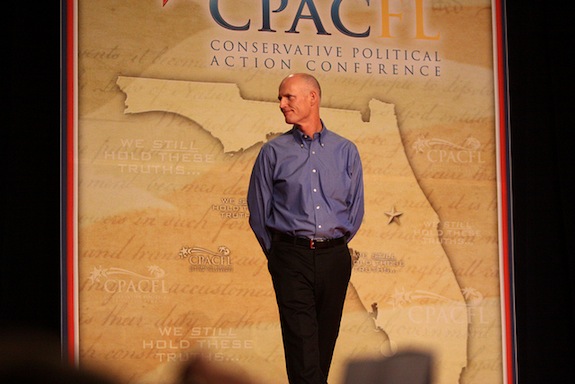
The federal government will hand over a database Gov. Rick Scott had requested to aid in the state's non-citizen voter purge. (Photo by Gage Skidmore.)
By Ashley Lopez
Florida Center for Investigative Reporting
Despite an ongoing battle between Florida and the federal government over the state’s effort to purge non-citizens from its voter rolls, the Department of Homeland Security (DHS) will now allow state officials to access the Systematic Alien Verification for Entitlements (SAVE) database.
State officials have said the database would allow them to identify more accurately potential non-citizens. Before the state announced this weekend that it would gain access to the federal database, officials sued DHS for withholding the records.
The U.S. Department of Justice, however, has sued the state over the purge, which federal government has alleged is illegal. Officials at the Justice Department have also warned the state that the SAVE database is not a comprehensive list of citizens and that the state did not provide specific identifiers necessary to properly cross-reference the state’s records with the federal government’s database.
Since the state first started its voter purge, Democrats and civil rights experts have said the effort unfairly targets minorities and could remove people who have the right to vote.
The News Service of Florida reported:
Secretary of State Ken Detzner said Saturday that the state has received access to a federal database that could allow it to move forward with a voter purge aimed at removing suspected non-citizens from the rolls…
“I am very pleased that the federal government has committed to giving us the access necessary to identify noncitizens on the voter rolls and make sure these ineligible voters cannot cast a ballot,” Detzner said in a statement released Saturday. “Florida voters are counting on their state and federal governments to cooperate in a way that ensures elections are fair, beginning with ensuring the voter rolls are current and accurate.”
Detzner almost immediately sent a letter to elections supervisors, many of whom have so far resisted the purge, suggesting that access to the federal database would allow the program to resume. The state had stopped sending names beyond a random sample to the supervisors after many complained it was riddled with inaccuracies.
In the letter, Detzner says the state and the federal government plan to sign an agreement allowing the state use the Systematic Alien Verification for Entitlements, or SAVE, database “very soon.”
“The first set of names we intend to review using the SAVE database will be the names provided to supervisors this past April,” Detzner wrote. “The results will be provided to you for additional actions in accordance with applicable laws.”
Detzner also reiterated the state’s argument that the initial sample turned up examples of noncitizens who were registered to vote, some of whom had cast ballots.
“These ineligible voters must be removed to ensure the integrity of our elections,” Detzner said.
Detzner also told election supervisors to consider the state’s flawed list “obsolete.”
There has also remained questions as to whether the state can remove voters from its rolls within 90 days of an election. Already, three different lawsuits have been filed against Florida for removing voters so close to the state’s presidential primary in August.
However, a judge struck down an effort to stop the purge — mostly because all of the state’s local election supervisors had stopped the purge themselves. Many supervisors decided not to carry out the purge because there were too many mistakes. In just the first batch of names handed to the officials, a number of citizens were found in the lists of suspected non-citizens.
Despite the problems that the state has already faced in carrying out the task of removing non-citizens from the voter rolls, Scott has said he hopes other states will join the effort.
Five presidential swing states — Ohio, Michigan, North Carolina, Colorado and Nevada — are among those hoping to use the DHS database to check their own voter rolls, according to CNN and the Associated Press.
“Hopefully,” Scott said, the agreement “creates a path for other states that have the same concerns.”
Colorado’s Secretary of State, Scott Gessler, has already threatened to sue DHS as well if the agency does not hand over its database.
